|
|
|
Sort Order |
|
|
|
Items / Page
|
|
|
|
|
|
|
| Srl | Item |
| 1 |
ID:
151526
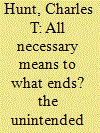

|
|
|
|
|
| Summary/Abstract |
A ‘robust turn’ in UN peace operations has ushered in a new generation of missions that are epitomized by increased authorization and willingness to use force towards the protection of vulnerable civilians and the implementation of stabilization strategies. This forceful transformation has important implications for not only particular components of the peace support effort but the overall endeavour. However, the potential unintended consequences remain underexplored and require further attention. This article examines the impacts of this so-called ‘robust turn’ in UN peace operations. The first section maps trends in modern peace operations that comprise the ‘robust turn’. It proceeds to explore a range of repercussions precipitated by these trends with particular focus on unintended consequences. The article concludes by identifying the associated implications for specific missions as well as the peacekeeping endeavour as a whole. It argues that the unintended consequences of the robust turn present significant principled and practical challenges for mission architects and managers, as well as their political masters, in achieving unity of effort in UN peace operations. It further argues that this could have ramifications for the future reputation, substance and viability of UN peacekeeping.
|
|
|
|
|
|
|
|
|
|
|
|
|
|
|
|
| 2 |
ID:
148982
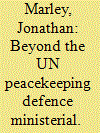

|
|
|
|
|
| Summary/Abstract |
After a period of declining contributions, there are signs of a renewed UK interest in UN peacekeeping missions. In this article, Jonathan Marley examines the factors that are driving the UK’s current approach. While London may be seeking a greater role in UN missions, to act effectively it will need to signal its intent to international partners and update its practices.
|
|
|
|
|
|
|
|
|
|
|
|
|
|
|
|
| 3 |
ID:
134109
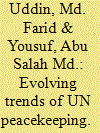

|
|
|
|
|
| Publication |
2014.
|
| Summary/Abstract |
Peacekeeping has emerged as one of the core activities of the United Nations (UN). Due to ground realities, the doctrines, principles and structures of peacekeeping have evolved in accordance with necessity. In the traditional phase, during the Cold War era, peacekeeping was mostly limited to monitoring and observation affairs. In the post-Cold War era, there was an expansion of peace operations and "minimum use of force", where necessary, emerged as an acceptable norm of peacekeeping. In the consolidation phase, after 2000, peace operations emphasised on peace building affairs i.e., democratisation, institution building, security sector reform (SSR) and human rights protection. The phase of New Horizon, which started in 2009 indicating changing trends, focuses mainly on development, capacity building, planning and oversight. It can be argued that the future peace operations are going to be more robust and multidimensional, and would concentrate on responsibility to protect civilians, human rights and environmental issues, gender mainstreaming, democratisation and institution building to achieve sustainable peace in the conflicting areas. Being a leading troops contributing country, Bangladesh will face new challenges to adapt with the emerging trends of UN peace operations. The challenges include dealing with new doctrinal issues and capacity building of its peacekeepers in the field level. In this respect, the main objectives of this paper are to understand the changing trends of UN peacekeeping and to identify potential challenges for Bangladesh and its likely responses in the coming days to continue its contributions in the UN peace operations.
|
|
|
|
|
|
|
|
|
|
|
|
|
|
|
|
| 4 |
ID:
123944


|
|
|
|
|
| Publication |
New Delhi, Institute for Defence Studies & Analyses, 2014.
|
| Description |
xxi, 163p.Hbk
|
| Standard Number |
9788182747517
|
|
|
|
|
|
|
|
|
|
|
|
Copies: C:2/I:0,R:0,Q:0
Circulation
| Accession# | Call# | Current Location | Status | Policy | Location |
| 057460 | 327.5406/BER 057460 | Main | On Shelf | General | |
| 057461 | 327.5406/BER 057461 | Main | On Shelf | General | |
|
|
|
|
| 5 |
ID:
099916
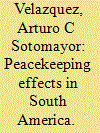

|
|
|
|
|
| Publication |
2010.
|
| Summary/Abstract |
Participation in UN peace operations has increased differences in civil-military relations in South America. Argentina, Brazil and Uruguay have internalized and implemented divergent defence policies, even as they have increased their troop contributions and been involved in similar or identical peacekeeping missions. This is caused not only by the fact that these countries have very different motivations for participating in peace operations; they have also drawn very different lessons from their exposure to peacekeeping.
|
|
|
|
|
|
|
|
|
|
|
|
|
|
|
|
| 6 |
ID:
121426
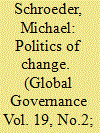

|
|
|
|
|
| Publication |
2013.
|
| Summary/Abstract |
The United Nations and many members were unenthusiastic when Nicaragua, a sovereign state, invited the UN to observe its elections in 1989. However, the UN accepted the invitation, and UN electoral services have since reached over 100 members. This article investigates UN involvement in elections from 1989 to 2006 and identifies important changes over that time in the kinds of electoral services that the UN provided. These changes cannot be explained solely by shifts in member interests, international norms, the distribution of power, or the market for electoral services. Instead, the UN made modest reforms to manage the conflicting pressures that these external shifts produced without stretching scarce resources or weakening its perceived legitimacy. However, each modest reform-an exception, symbolic institutional change, or new leadership vision-triggered additional changes by reconstituting member or bureaucratic preferences. This article specifically highlights three change processes that these reforms triggered: normalizing deviance, expanding demand, and offering political cover. These findings have important implications for scholarship on UN reform, the provision of electoral services, and the role of the UN's leadership.
|
|
|
|
|
|
|
|
|
|
|
|
|
|
|
|
| 7 |
ID:
142429
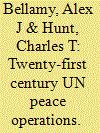

|
|
|
|
|
| Summary/Abstract |
United Nations peace operations are deployed in greater numbers to more difficult operating theatres in response to more complex conflict situations than ever before. More than 100,000 UN peacekeepers are deployed in missions mandated under Chapter VII of the UN Charter to use ‘all necessary means’ to protect civilians from direct harm as well as to achieve a host of other tasks such as supporting the (re)building of state institutions, facilitating humanitarian aid, and overseeing compliance with ceasefire agreements and political commitments. With increasing regularity, UN peacekeepers are instructed to complete these tasks in contexts where there is no peace to keep or where peace is fragile. To understand these changes, and the implications for UN peace operations, this article examines three key transformations: the emergence of the protection of civilians as a central mission goal (and accompanying principles of due diligence); a subtle move away from peacekeeping as an impartial overseer of peace processes towards the goal of stabilization; and a so-called ‘robust turn’ towards greater preparedness to use force. It identifies the challenges posed to contemporary UN peacekeeping operations by these transformations and evaluates the UN's efforts thus far to make peacekeeping fit for purpose in the twenty-first century, noting that while significant progress has been made in areas such as policy and guidance, force sustainment and deployment, and the application of force enablers, there remains a considerable way to go.
|
|
|
|
|
|
|
|
|
|
|
|
|
|
|
|
| 8 |
ID:
087827
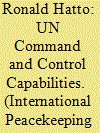

|
|
|
|
|
| Publication |
2009.
|
| Summary/Abstract |
Command and control has always been a weak point in UN peace operations. Its inefficiency was clearly demonstrated during the 1990s in both Somalia and the former Yugoslavia. This inefficiency had the effect of pushing traditional Western contributors away from UN peacekeeping. This article examines the impact of the Strategic Military Cell (SMC) established in August 2006 to supervise the UNIFIL II mission in Lebanon on its operational effectiveness, political impacts and influence on traditional contributors. The article argues that the SMC's impacts are rather minimal and that only few of its attributes will be adopted by the UN's Department of Peacekeeping Operations for other missions.
|
|
|
|
|
|
|
|
|
|
|
|
|
|
|
|
| 9 |
ID:
161272


|
|
|
|
|
| Summary/Abstract |
This article develops an International Practice Theory (IPT) approach to United Nations peace operations through the study of the UN Stabilization Mission in Haiti (MINUSTAH). MINUSTAH saw the introduction of new practices within the context of a UN peace operation, namely the use of joint military-police forces to conduct offensive action against armed groups that were labelled as ‘gangs’. While more objectivist problem-solving approaches would argue that the UN mission was simply adapting to the situation on the ground, an IPT lens reveals that there was considerable struggle to integrate these new practices within the repertoire of peacekeeping. The article argues for the benefits of applying an IPT lens to peace operations while proposing to develop theoretical and methodological approaches that have been less prominent in IPT. Theoretically, it posits that IPT can better articulate practice and discourse by paying more attention to what actors say about what they do.
|
|
|
|
|
|
|
|
|
|
|
|
|
|
|
|
| 10 |
ID:
174095


|
|
|
| 11 |
ID:
167914


|
|
|
|
|
| Summary/Abstract |
There are 14 UN peace operations underway around the world, employing almost 100,000 soldiers, policemen and civilians at an annual cost of nearly $7 billion. Since it began its first peacekeeping efforts in 1948, the UN has launched over 70 such missions. Peacekeeping, and the wars it is supposed to help end, have evolved over that time. The earliest efforts concerned wars between countries over territory and were operations with straightforward goals. As peacekeeping became applied to civil wars, the objectives became complex and much more difficult. The most recent missions have had to deal with violent extremism, and that has made it impossible for the peacekeepers to succeed. The result is that peacekeeping today makes little contribution to peace and the peacekeepers have become ineffective and increasingly victims of the conflicts with which they have been asked to deal. To put it somewhat metaphorically, peacekeeping is a bandage and not a cure. It can help stop the bleeding, but it cannot heal the wound. To explain why that is the case requires tracing the changes in warfare and describing what the peacekeepers are asked to do as opposed to what they are capable of doing.
|
|
|
|
|
|
|
|
|
|
|
|
|
|
|
|
| 12 |
ID:
174089


|
|
|
|
|
|
|
|